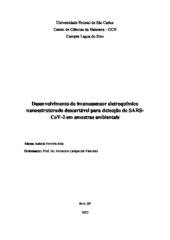Desenvolvimento de imunossensor eletroquímico nanoestruturado descartável para detecção de SARS-CoV-2 em amostras ambientais
Abstract
Currently, advanced physicochemical processes require materials with a combination of properties not found in conventional materials. Materials formed by the association of organic and inorganic compounds are an alternative for the preparation of new materials and these with properties superior to those presented by the constituents when they act individually. Electrochemical immunosensors based on disposable screen-printed electrodes (SPEs) are a cheap, portable, sensitive and versatile option for clinical applications outside the laboratory environment and without the use of external reagents. In this context, in the present project a portable and disposable electrochemical immunosensor was developed for the detection of Spike protein (SP) in environmental (river water) and clinical samples (artificial saliva and blood serum), the sensor was based on a screen-printed electrode modified with carbon black base film and gold nanoparticles (AuNPs). The experimental parameters, such as solution pH and parameters of the voltametric technique, were optimized for square-wave voltammetry (SWV). SW voltammograms were recorded after different incubation times, ranging from 10 to 150 min, in the presence of 7.65 ng mL−1 of SP solution. In this scenario, two defined calibration conditions were evaluated: one optimized with incubation of 120 min and another with incubation of SP of 10 min. To evaluate the performance/efficiency of the Immunosensor AuNPs-CB/PET-SPE to detecting the Spike protein of SARS-CoV-2, the positive samples under the 120 min incubation regime presented greater current loss and lower standard deviation values considering the measurements performed in triplicate, which demonstrate be a relevant result for the detection of SP in the proposed samples. Under optimized conditions, the biosensor presented detection limits (LODs) of 101 fg mL−1 and 46.2 fg mL−1 for incubation times of 10 min and 120 min, respectively. It is important to highlight that the final cost of the proposed immunosensor (US$ 0.29), proves its cost-benefit over other detection techniques/methods.
Collections
The following license files are associated with this item:

